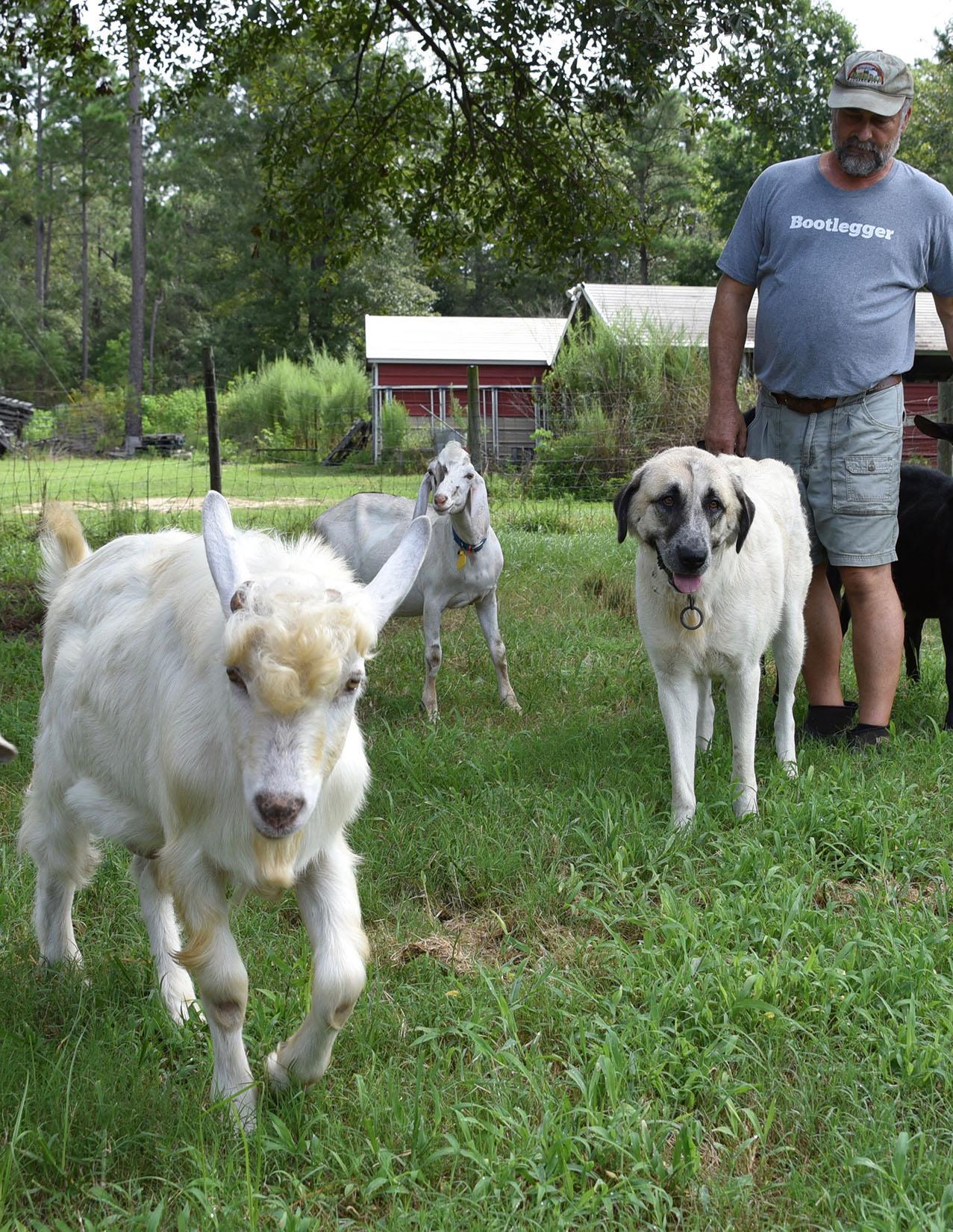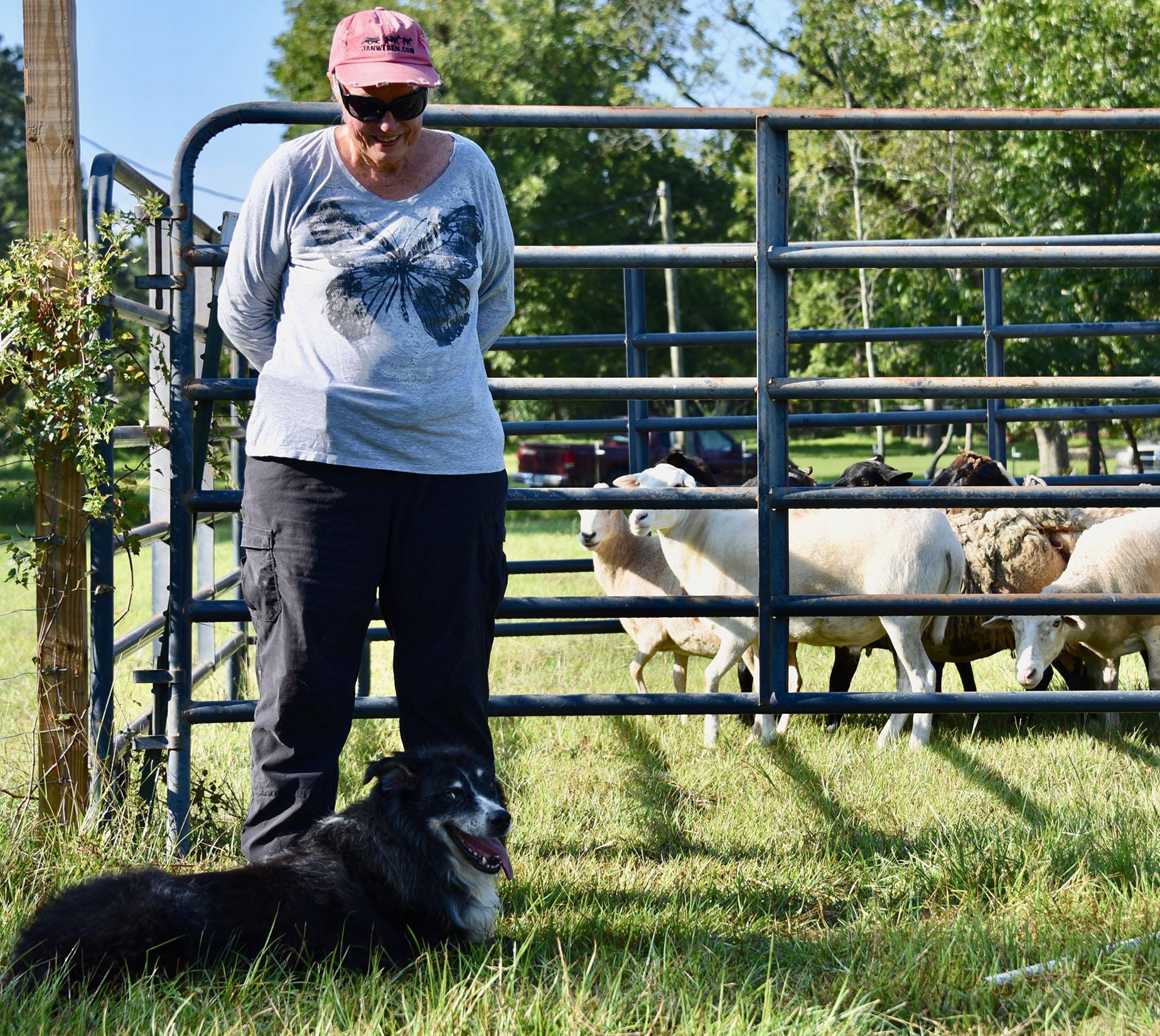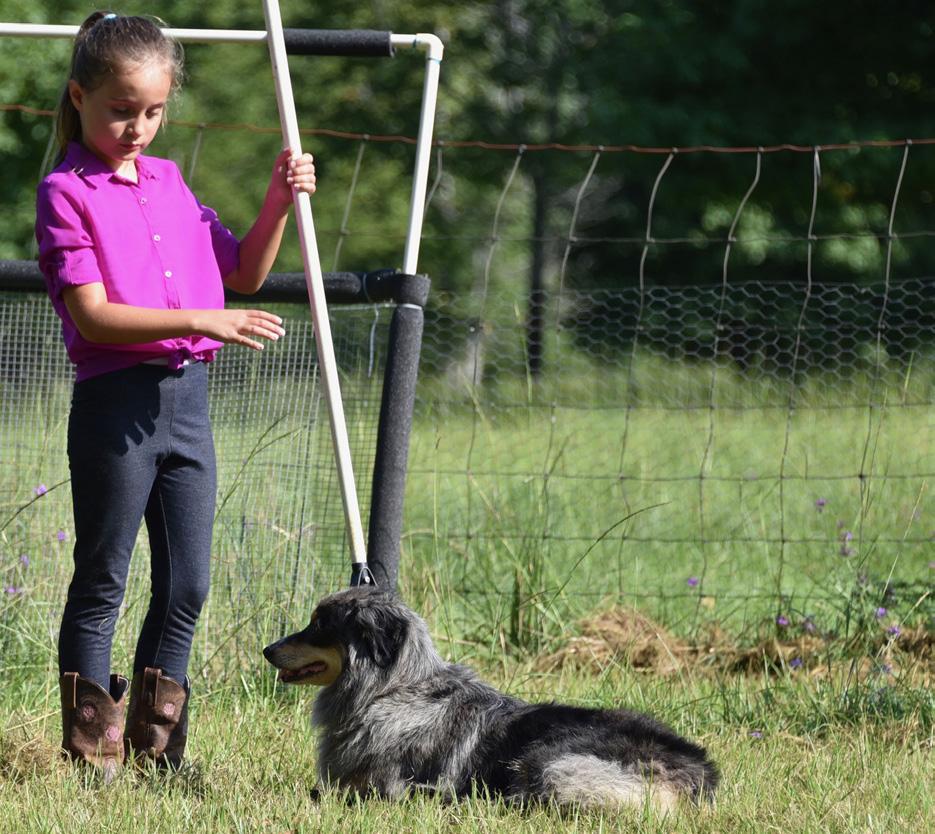
13 minute read
Working Dogs: man’s best friend on the farm
by LeeAnna Tatum
When we pause to consider and be grateful for all those who played a role in ensuring that we have food on the table, there’s a good chance that we give little thought to man’s best friend. After all, in most homes, the dog is more likely to be blamed for taking food from the table, not helping it get there in the first place!
Advertisement
But working dogs have important jobs to do within our local food systems!
Whether they are solitary protectors guarding against predators or are working closely with their humans to safely guide livestock to where they need to be, dogs are some of the hardest working hands (paws?) on the farm.
So, to give them their due, we wanted to take this opportunity to introduce you to some of these hardworking and heretofore unsung farm heroes from our local farms who work tirelessly without vacation or overtime pay to make sure that you can enjoy things like: fresh eggs, dairy products and pasture-raised meats.
Johnny of Whippoorwill Farms

Meet Johnny of Whippoorwill Farms in South Carolina. Johnny is a German Shepard, approximately three years old, who was rescued from a local animal shelter. His primary job is to help his human roundup errant pigs and piglets. He also serves as security guard as his presence on the property provides a deterrent to predators.
Johnny has been on the farm for about six months, during which time he has gone from having an overactive predator drive which threatened livestock to being an indispensable member of the farm team.
Marissa Paykos had been looking to add a livestock guardian to the farm and was on the waiting list for a Great Pyrenese or other more traditional guardian breed. But in the meantime, Johnny became available at the local rescue.
“We’d been looking for some livestock guardian dogs, but I’m a big fan of rescue and I don’t really like to buy a dog when there are so many that need to be rehomed,” Marissa explained. “I like to wait until something comes along that seems like it will fit.”
When Marissa found out about Johnny, she called the rescue group to discuss a possible adoption.

Our advertisers make it possible for us to bring you the stories of our local food systems.
“I had called and talked to them and they said that he had been rehomed twice because of his prey drive. They didn’t seem convinced that we would be able to take him on and train him, but they agreed that I could take him for two weeks and see if it worked out.”
Within only a few hours of being on the farm, Johnny proved he had earned his reputation as a predator and it became clear that Marissa’s work was cut out for her.
Undeterred, she set out to retrain Johnny’s way of thinking and to focus his attention on her. She tethered him to her so that he was by her side throughout her day as she did her chores around the farm. When not tethered to her, she worked on his recall.

“After having him tethered to me for two weeks he really started respecting me,” Marissa recalled. “I never used a shock collar. Treats weren’t really something that got him excited, so it was mostly just lots of praise and keeping him working all day.”
“He sometimes gets excited with the chickens and the ducks, but what he’s really helpful with is the pigs. We have pigs that get out because we use all electric fencing. Especially when I’m training new pigs or piglets to stay in the fencing, he’s been really instrumental in helping me keep the herd together.”
Johnny was fortunate to find in Marissa someone who refused to give up on him. She was able to see beyond the downside of his predator drive (killing chickens) to find an appropriate use for his talents (wrangling pigs) and in the process not only did Johnny find a good home where he has plenty of work to keep him busy, but Marissa gained a valuable helper on the farm.
“We have about 50 pigs right now, so it would really be too much for me to manage on my own without his help. A lot of those pigs are small and training on the fence and it just makes it much easier to have Johnny here to help. I can’t imagine not having him now. He’s a great dog!”
The Dogs of Bootleg Farm: Zoie, Shepard and Griff

Introducing the livestock guardians of Bootleg Farm in Springfield, Zoie (see photo on page 10) and Shepard (pictured above). Zoie and Shepard are Anatolian Shepherds, a breed of dog that likely goes back thousands of years originating in Turkey. As livestock guardians, they live peacefully among the flock (in this case goats) and their job is simple - defend against predators. Zoie is approximately seven years old and Shep, one of her offspring, is three.

Nipping at their heels (and sometimes their faces) is Griff.
Griff is a Blue Tick Heeler. Rescued as a puppy and raised on the farm, Griff’s job is to play “bad cop” to his human’s “good cop” when it comes to encouraging reluctant goats to get in line for milking or to be moved along to another area of the pasture. His side hustle on the farm is moving fallen branches from one place to another.

Bootleg Farm is a goat dairy and also home to chickens, ducks and geese. The canine workforce handles security and crowd control, in a manner of speaking. Richard Cowart appreciates the different forms of assistance his dogs provide, whether it’s the peace of mind he gets from knowing his guardians are on the job at night or the extra help in the morning Griff provides with keeping the goats in line - his dogs definitely have an important part to fill on the farm.
Zoie and Shepard work together to ensure the other animals on the farm are safe from hungry predators. They patrol the perimeters and also spend time with the goats, blending in and keeping an ever-watchful eye for danger.
“We’ve not lost an animal to a big predator,” Richard said. “We know there’s a big bobcat in the area and we hear the coyotes all the time … we’re probably halfway between the Savannah River basin and the Ogeechee River basin, so we have that wet swampy land to the outskirts of both sides of us which is prime for those coyote and foxes.”
Richard has recently begun raising rare breeds of geese and chickens, which are much more susceptible to fox predation than the goats. But the Anatolians have done a good job of keeping them safe.
“I worry more about foxes for my ducks, geese and chickens,” Richard explained. “I’ve just gotten into working with the nature conservatory with Cotton Patch geese and Sussex chickens. The Cotton Patch is a critically endangered breed of geese and the Sussex is recovering. I worry about the foxes with them, but I haven’t lost anything to a fox that I know of but I have found some fox carcasses.”
“If you’ll notice, this is kind of how they work, Shep came down here with us to the goats,” Richard said as we walked through the pasture, “and Zoei stayed back there ... That’s pretty typical of this breed - one will stay around or pretty close to the flock and the other will do it’s own thing off to the perimeter. And for as big as they are, you’d be surprised how fast they are.”

“The name ‘Anatolian Shepherd’ the ‘shepherd’ is only part of the name in the sense that he’s shepherding to care for or protect them,” Richard explained, “he’s not shepherding as far as moving them around and herding them or walking them from here to there.”
That job belongs to Griff.
Griff earns his keep first thing in the morning when it’s time to milk the goats. It’s his job to ensure that the stragglers move along when it’s their turn to be milked. By having Griff to help move the goats through, Richard is able to maintain a calm demeanor and ensure the goats don’t get overly excited prior to milking.
“In the morning, the first two sets (of milking goats) come in like clockwork and we do seven rotations … the next ones get a little ornery … what happens is Griff comes in with me and I just tell him to move them around. I have to keep him under control a little bit because as you can see he is kind of high strung,” Richard says with a laugh as Griff barks and growls at Shep.
“When milking, it’s very helpful because you don’t want to get aggravated and loud because you want the goats to stay calm. So if the dog can go in there and move them around and you’re not fussing and screaming - it’s very helpful.”
With approximately 120 goats - 56 that are milked every day - on the 50 acre farm, the dogs are an essential part of the team, helping to keep things running smoothly and providing peace of mind.
The Australian Shepherds of Wildhaven Farm: Jake and Snippy
This is Jake from Wildhaven Farm in Midville. Jake is an Australian Shepard from a very distinguished pedigree. His job on the farm is to help his person easily move livestock (sheep and cattle), saving her time and energy and keeping her safe.

Jake’s daughter Snippy is learning to herd as well. She often works closely with her smaller person as the two of them learn together to communicate and effectively move livestock around the farm. Not fond of the sheep, Snippy prefers working with the cattle and ducks.

Barbara Hammond was first introduced to the Australian Shepherd breed in the 70’s when she acquired her first dog from the Hartnagle family in Colorado. Dogs from this kennel can trace their lineage back to the earliest dogs as the breed was being established here in the US.

Jake comes from a long line of champions and working dogs, so his herding instincts are very strong. He has sired many litters and has offspring living all around the world. But for Barbara his greatest value is his companionship and the invaluable assistance he provides around the farm.
“They save me so many steps - I don’t think I could do this at my age without the dogs,” Barbara, age 75, asserts. “Also, it’s for safety. Jake is amazing. We had a bad ram once and that thing would charge you and he charged the dogs, but within two months Jake had him to where he would not go near the dog and if the ram came near me, Jake was on him. He would not let anything hurt me.”
Wildhaven Farm hosts a small number of sheep and Australian lowline cattle which are raised as breeding stock. Barbara relies on her fourlegged co-workers to help her safely move and work around the livestock.
“We move stock mostly,” Barbara explains. “My chores for them are: moving stock from one pasture to another, guarding a gate (because when you go through a gate sometimes the cows and the sheep want to get out the gate) ... Also when you put hay out, you have to take a string off the hay bale and you have to put the hay feeder down and you don’t want the cows to get hit by it and you also don’t want the cows all over you while you’re doing your work. So the dogs’ job is to keep the cows off of you. Anywhere you put the dog is where you don’t want the stock.”
Jake is extremely focused on his work and he and Barbara work in partnership to move the livestock
where she needs them to be. As Jake is getting older (he’s about eleven), she is also working to train up two of his offspring to be able to take over when it’s time for him to retire.

Our advertisers make it possible to share the stories of our local food systems!

Barbara’s granddaughter Jaley is learning to work with the dogs and she and Snippy are learning together by working with ducks. Ducks are small enough to not be any danger to Jaley as she and Snippy learn the finer points of working together to move stock.
Snippy does not quite have her father’s intensity, but she is eager to work and clearly fond of her young handler.

“She doesn’t have the same level of training that Jake has, but I can get her to do what I need her to do,” said Barbara, “and she’s especially good with cows - she loves, loves, loves cows! She’s not too aggressive, but she’s aggressive enough.”
“But it’s a partnership, you really have to be in a partnership with your dogs - it’s a team effort. You can’t make them do it, it’s instinctual.”
“Jake has what you call ‘eye’ … he can control stock from across the field because of how he looks at them and with body language … he has a predatory stalk. Everything you’re doing with them is channeling prey drive,” Barbara explained.
“I can stand here by the gate, and he’ll bring the animals to me - saves me a lot of steps!”
Barbara clearly loves her dogs and enjoys working with them, but it’s also evident that they serve a very important role on the farm by saving her a great deal of physical exertion and also keeping her protected from the livestock as she goes about her chores.

As we gain a better understanding of where our food comes from and learn to not take for granted the food on our tables; let’s take a moment to appreciate all the hard working farm dogs who protect livestock from predators and help farmers work more safely and efficiently with their animals.
It should also not go unacknowledged that working dogs love to work. There may be an inclination to feel sorry for these dogs that are denied a couch potato lifestyle indoors, but with their personalities and instincts, these dogs are literally doing what they’re born to do!
Whether it’s the active lifestyle of the heelers and herders who tend to be high-energy dogs with a great deal of intelligence and desire to please or the guardian breeds who exhibit more of an independent nature with a laid back appearance and an underlying ferocity - these dogs live in a way that harnesses and utilizes their natural tendencies and strong instincts.

Our advertisers make it possible to share the stories of our local food systems!










